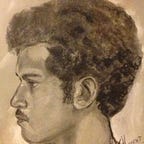Forever in the Path: Tuskegee and the Origins of the Movement for Civil Rights (Part 4).
By December 8, 1941, my father had done like many others of his age and generation — he had appeared at Fort Snelling, Minnesota to enlist in the United States Army.
He was nearly the entire length of the continent away from Tuskegee, Alabama and the experiment that changed the war and much of the course of American life. The Army my father finally was allowed to join in the early forties was entirely segregated.
Indeed, according to family history, my father, with his light skin and relatively straight hair, was told by the enlistment officer “you ain’t no nigger” or words to that effect when he wrote “Colored” on his enlistment papers.
The America that would fight Hitler and fascism in Asia and Europe was as virulently racist as since the end of Reconstruction. It mattered not that he was at Fort Snelling, Minnesota or in any other place in 1940’s America.
But my father was fortunate. He was ultimately admitted to Officer Candidate School and by the time that Moton Field was training pilots, he. was assigned there.
My father would serve as the Base Adjutant under the command of a white officer: Lt. Colonel Noel Parrish. From all indications, Parrish believed in the Tuskegee Program; he believed Black Army officers could learn to fly. And they did, including my father.
But, like nearly everything else in American life, if Blacks were to be fully accepted in a new role, they had to not only succeed, but to excel. And this meant making sure the critics of the Tuskegee flying experiment had no grounds for attack on any basis.
It was Alabama in the South, after all, and America had just barely left the Depression. The rural South as much as anywhere had been hard hit.
The base PX (post exchange) and the Mess Hall were ideal targets for illicit sales of foodstuff and if discovered might have been the political ammunition needed by Dixiecrats who wanted the Tuskegee Program to end.
It seems that as to actual flying, there were actually no real objections that the opponents could raise. Tuskegee fliers not only fought overseas but flew ferry missions within the United States.
The Black fliers would go on to Italy and North Africa as the 99th Pursuit Squadron and became so accomplished as bomber escorts that they would shoot down some of the first German fighter jets put into the War.
There was long an apocryphal legend that Tuskegee’s 99th Pursuit Squadron never lost an American bomber to enemy fire, but careful research shows that to be less than accurate. But what seems to be accurate was that in 200 missions the 99th Pursuit Squadron lost about 25 bombers to enemy forces.
Yet, this success rate was nearly twice that experienced by the 15th Air Force overall.
Yet, those like my father who remained to run the training base at Moton Field fought a different battle. Their battle included maintaining the integrity of the Tuskegee Program while critics and naysayers looked for flaws.
An easy way to close down Moton Field would be by finding evidence of misconduct in its operations: such as proof of a so-called Black market.
Parrish knew this and to fend off this possibility he placed my father in charge of securing the mess hall and the PX.
My father did his job so well that there was never an off-base market from the all-Black airbase. Indeed, my father was alleged to have told an officer who outranked him that he must like everyone else pay for his meal in the Mess Hall.
There was no room for mistakes at Tuskegee. Whether it was during the time a white flight instructor shouted his in-flight training instructions or in. base operations. An error might have been the end of the experiment — not only for a few soldiers — but for an entire people.
The men who served at Tuskegee likely never saw themselves as so unusual. Many went on to ordinary lives. Some like Emmett Rice, the father of Susan Rice, led extraordinary lives for Black Americans in the 1950’s and 1960’s. Others like my father never forgot the experience of living in the segregated South. By all accounts my father despised this part of his Army Air Corps’ experience.
My theory is that this experience for men like my father and Ralph Bunche, who served in the Office of Strategic Services, planted the seeds of the Movement for Civil Rights. They never could or would see themselves as second-class citizens again. They knew they had already done the impossible.
-Albert Turner Goins, Sr.
(to be continued)
